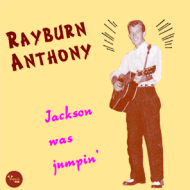Rayburn Anthony – Jackson was jumpin‘
1.Jackson was jumpin‘
2.Dance
3.Dreamer that I am
4.She’s a Cadillac
5.Since you’ve gone
6.On my way to Gothenburg
7.Let the four winds blow
8.Fraulein
9.If she looked at me
10.Puti-puti
11.Sing me a love song
12.Rollin‘ in my sweet baby’s arms
13.Redneck crowd
14.Joe’s place
Yeah! – This is the real thing – Original Sun Recording artist Rayburn Anthony rocks through an unbelievable session backed by the incomparable Wildfire Willie and his great band. Rockabilly at its very best.
Rayburn Anthony was born in the small town of Humboldt, Tennessee in May 1937. His father was a farmer who also painted houses to make ends meet and to feed and clothe his eight children , four girls and four boys. Like so many Southern families, the Anthony’s went to church every Sunday and so church music was an important influence on him. His elder brother Bob played guitar and so young Rayburn started picking up a few tips from him. Bob played in a small band and eventually started taking Rayburn along too. The band didn’t have a regular singer as they mostly played instrumentals and so whenever someone asked for a song Rayburn would get to sing. Humboldt lies just outside of Jackson Tennessee and there were quite a few clubs in the area where the new rocking music was being played. This was the area the Perkins boys had honed their skills in and Carl’s drummer W. S. Holland also lived in Jackson. W. S., or Fluke as he is better known, decided the come off the road after the success of ‚Blue Suede Shoes‘ had taken the Perkins band all over the nation. Fluke then started managing and working with Carl Mann who he had met in a club. Near Jackson was a club called the Pineridge and Fluke and Carl Mann would drop by there, as it was one of the few clubs open late. The other acts would sit in with Rayburn and he remembers that Kenny Parchman and his band, which included Smoochy Smith, would jam with them. Rayburn says Kenny was „Quite a party person“. So at times there would be Eddie Bush on guitar, T. Willie Stevenson on bass, T. Willie’s sister Ella May on piano and W. S. on drums ‚quite a band‘ in Rayburn’s own words. Obviously working onstage with him gave Fluke Holland a good insight into Rayburn’s potential and impressed with his singing Fluke suggested they go along to Sun Records to audition. Rayburn remembers there being a whole band along with him but they asked him to sit down at a piano and play a few tunes. Sam Phillips laid a hand on his shoulder and said he liked what he heard and a deal was made. Rayburn was amazed as he thought they were going to another audition later with the band.
Over the next year Rayburn cut more than a dozen songs at Sun, most of them in the new studio on Madison Avenue. He used the same guitar player as Carl Mann did, the remarkable Eddie Bush and usually Tony Austin another local on drums and T. Willie Stevenson on bass. Fluke also played on some of the sides. Rayburn credits Tony Austin as being an inspiration „He was always positive and a great writer as well as a great drummer.“ Tony (who of course worked with Johnny Burnette) was in Rayburn’s road band for many years. Sam obviously could see that the out and out Rockabilly was no longer commercial and tried Rayburn out on ballads and folksy material. He even brought in an outside producer Vinnie Trout and on the last unreleased session they used strings. Three singles were released on Sun and Sam had high hopes of Rayburn’s unusual treatment of ‚St. Louis Blues‘ even lining up a trip to St. Louis to promote it. Rayburn says that the payola scandal had hit hard and this trip was cancelled. ‚There’s No Tomorrow‘ was a fine side that deserved success and ‚Big Dream‘ rounds off the trio of Sun singles. Among the unreleased tracks was ‚Hambone‘ done on two separate occasions by Carl Perkins and Rayburn’s version is equally good if a bit more countrified. His memories of Sun include the time when Sam brought in a blond to help get Rayburn in the mood for a love song „It just made me more nervous“ was Rayburn’s recollection. At Sun the clock was totally ignored. Sessions would never start on time and often went on into the wee hours of the morning. „He’d (Sam) just let you play until he heard something he thought he could do something with.“ Rayburn says T. Willie would sleep in the car on the way
home as he had to be up early for his daytime delivery job! Rayburn didn’t go on any of the package shows as they were all gone by the time his Sun records came out but played small clubs. He did run into some of the others at the studio, Warren Smith would drop by and Elvis too when he was getting ready to go out with his friends to the roller-skate rink. He met Scotty Moore in Memphis and this would be very helpful to him in the near future but first he began writing for Bill Black’s music company. His first success came when Sandy Posey put ‚Caution To The Wind‘ on the B side of her hit ‚Born A Woman‘. ‚Caution To The Wind‘ was co-written with friend Gene Dobbins and Sandy also cut another song for her album. The big market for a songwriter was Nashville and Rayburn moved to Music City and began working at Scotty Moore’s Music City Recorders. This gave him a base to pitch is songs too and lots of studio time to record demos of his songs. Scotty and DJ Fontana would play on some of them. He began working on the road too with Billy Walker and Billy recorded a number of Rayburn’s songs including two top ten hits. ‚Sing Me A Love Song To Baby‘ hit number one and ‚Keep On Keep On Loving You‘ made the top 10. Rayburn was making records himself for a variety of small labels but his big break came when he started working with Bobby Bare. He worked for Bare for four years touring in the US and Europe and Bare helped get him a contract with Polydor Records and Rayburn started to get his own chart records.
His own favourite from that period is ‚Maybe I Should Have Been Listening (When You Said Goodbye)‘ which he says „Gets down to the meat of the story.“ Label shake-ups led to him being switched to Mercury where he recorded with Jerry Kennedy. Reba McEntyre was on the same label at the time and she can be heard singing in the background on one of Rayburn’s songs ‚Easy.‘ Rayburn had high hopes of a song called ‚Cheating Fire‘ but Conway Twitty cut it too and as he was hot at the time, Rayburn’s version was overlooked. Another Mercury cut ‚Wildside Of Life‘ has a narration by Kitty Wells. His biggest hit on Mercury was ‚Shadows Of Love‘ which made the top 20. Other big names he has worked with include Pappy Daily who cut him on a song called ‚You’re Driving Me Out Of Your Mind‘ but this was shelved when another act came out with a similar title. His Musicor session was produced by Bob Moore. He cut ‚I Walk The Line‘ for Stop Records and wrote ’40 yards Of Real Estate‘ for The Jordanaires Stop album ‚Monsters‘. Other acts to have recorded his songs include Charlie Louvin and Melba Montgomery, Conway Twitty and Loretta Lynn, Charley Pride, Vern Gosdin, John Conley and Jerry Lee Lewis. Jerry Lee cut ‚Thanks For Nothing‘ a Dobbins/Anthony song for his ‚Boogie Woogie Country Man‘ LP. Another Lewis connection when Rayburn told me recently he played bass for Linda Gail Lewis one night. He also played with Carl Perkins at one time playing keyboards and rhythm guitar. Some personal and health problems led to Rayburn giving up showbiz for a while but when asked to do a one off show for a New Year’s Eve party, he decided this was what he really should be doing and he recorded a great single ‚I May Never Get Too Old For Bluejeans’/’A Way To Survive‘ for his own Sunray label and it climbed high in the independent charts winning some excellent reviews. Sweden seems to have taken to Rayburn in a big way and he has toured there many times over the past ten years or so playing clubs, fairs and churches where he goes back to his gospel roots.One one of his trips he was asked to record in a vintage studio with Swedens own Wildfire Willie and The Ramblers and the results make up this CD. One of the tracks ‚Jackson was Jumping‘ was written after I interviewed Fluke Holland and he told me about the many clubs and musicians in the Jackson area. I particularly liked the story about the loggers fighting in the car park and Fluke finding knuckle imprints on his car! Rayburn liked the song idea and finished it off taking it with him to Sweden. In 2000 he performed it in Jackson with W. S. on drums which kinda took him all the way back to the man who discovered him. Yeah, Jackson was jumping and the music on this CD will have you jumping too. Jim Newcombe
